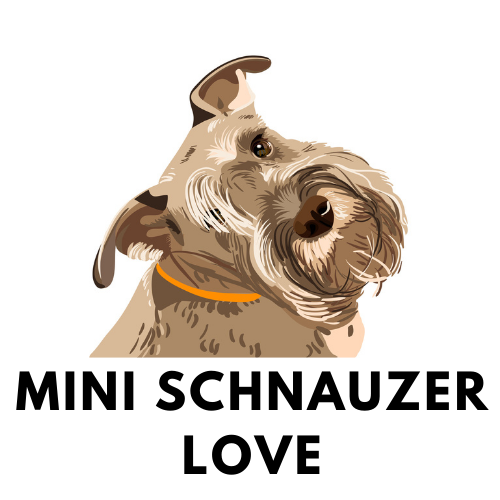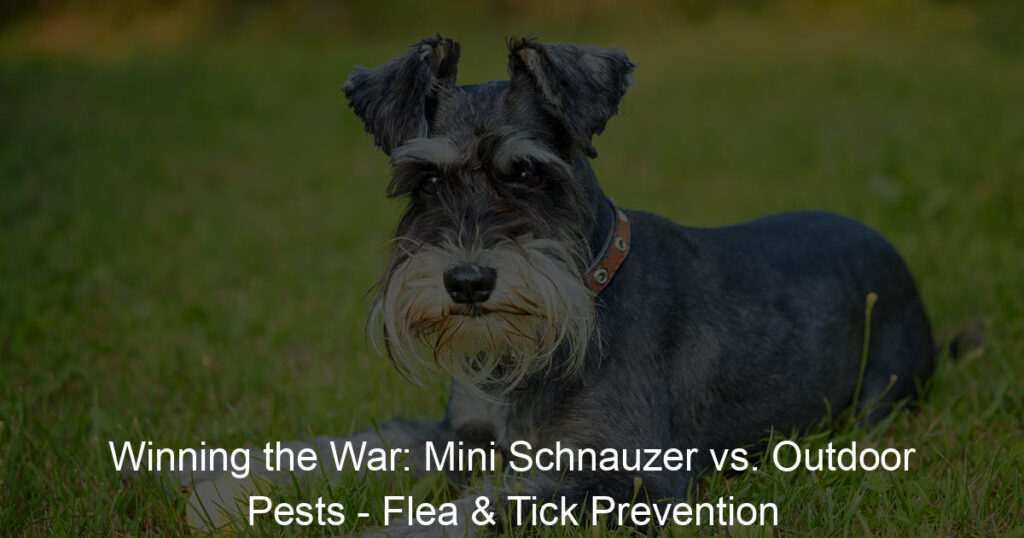
Introduction to Mini Schnauzer Flea Prevention
As a Mini Schnauzer owner, it’s essential to understand the importance of flea prevention. Fleas are not just annoying pests; they can cause severe health issues for your beloved pet. Let’s delve into the significance of flea prevention and debunk some common misconceptions.
- Understanding the Importance of Flea Prevention for Mini Schnauzer
- Common Misconceptions about Flea Prevention in Dogs
Fleas are more than just a nuisance. They can cause a variety of health problems for your Mini Schnauzer, including skin irritation, allergies, and even anemia if the infestation is severe. Furthermore, fleas can carry diseases that can be transmitted to your pet. Therefore, it’s crucial to prevent flea infestations before they start.
There are several misconceptions about flea prevention in dogs. One common myth is that indoor dogs do not need flea prevention. However, fleas can enter your home in various ways, such as through other pets or even on your clothing. Therefore, even indoor dogs need regular flea prevention.
Another misconception is that flea prevention is not necessary during colder months. While it’s true that fleas are less active in cold weather, they can still survive and reproduce indoors. So, year-round flea prevention is vital for your Mini Schnauzer’s health.
In conclusion, flea prevention is a critical aspect of pet care for your Mini Schnauzer. By understanding the importance and debunking common misconceptions, you can ensure your pet stays healthy and happy.
Outdoor Pests Protection for Dogs
When it comes to our furry friends, their safety is our top priority. Dogs, especially breeds like the Mini Schnauzer, are susceptible to various outdoor pests. Let’s learn how to identify these pests and protect our pets from them.
Identifying Outdoor Pests
Identifying pests is the first step in protecting your dog. Let’s look at some common outdoor pests that affect dogs and specific pests that pose a threat to Mini Schnauzers.
- Common Outdoor Pests That Affect Dogs
- Fleas: These tiny insects can cause itching, hair loss, and even diseases in dogs.
- Ticks: Ticks are known to carry diseases like Lyme disease and can be harmful to dogs.
- Mosquitoes: Mosquitoes can transmit heartworms to dogs, which can be life-threatening.
- Specific Pests That Pose a Threat to Mini Schnauzers
- Fleas: Mini Schnauzers have a dense coat that provides an ideal environment for fleas to thrive.
- Ticks: Ticks can easily hide in the thick fur of Mini Schnauzers, making them hard to spot and remove.
Dogs are often victims of various outdoor pests. Some of the most common ones include:
Mini Schnauzers, due to their small size and dense coat, are particularly susceptible to certain pests. These include:
Now that we know what pests to look out for, we can take steps to protect our dogs. Remember, prevention is always better than cure.
Best Practices for Outdoor Pests Protection
Keeping your Mini Schnauzer safe from outdoor pests is a top priority for every pet owner. Here are some best practices to ensure your dog’s protection.
- Regular grooming and inspection
- Use of preventive products
- Keeping the outdoor environment clean
Regular grooming is not just about keeping your Mini Schnauzer looking good, but it’s also a vital part of pest prevention. During grooming, inspect your dog’s skin and fur for any signs of pests. Look for tiny black or brown spots, which could be fleas or ticks. Regular grooming and inspection can help detect a problem early before it becomes a major infestation.
There are many products available that can help prevent pests from targeting your Mini Schnauzer. These include flea and tick collars, sprays, and topical treatments. Always consult with your vet before starting any new preventive products to ensure they are safe and suitable for your dog. Remember, prevention is always better than cure.
Keeping your yard clean can significantly reduce the number of pests that could potentially harm your Mini Schnauzer. Regularly mow the lawn, trim bushes, and remove any piles of leaves or debris where pests might hide. A clean outdoor environment is less attractive to pests, making it safer for your dog.
In conclusion, protecting your Mini Schnauzer from outdoor pests requires regular grooming and inspection, the use of preventive products, and maintaining a clean outdoor environment. By following these best practices, you can ensure your dog’s health and happiness.
Tick Prevention for Mini Schnauzer
Keeping your Mini Schnauzer safe from ticks is a crucial part of pet care. Let’s delve into understanding tick infestations in dogs and how to prevent them.
Understanding Tick Infestation in Dogs
Tick infestation in dogs is a common problem, especially for breeds like the Mini Schnauzer that love to explore outdoors. It’s important to understand how ticks latch onto dogs and the health risks associated with tick infestations.
- How ticks latch onto dogs
- Health risks associated with tick infestation
Ticks are small arachnids that feed on the blood of mammals, including dogs. They wait in tall grass or shrubs, and when a dog passes by, they latch onto its skin using their sharp mouthparts. They then insert their feeding tube to draw blood. Ticks can remain attached to a dog for several days if not detected and removed.
Tick infestations can lead to serious health issues in dogs. Ticks can transmit diseases like Lyme disease and Rocky Mountain spotted fever. Symptoms can range from fever, fatigue, and loss of appetite to more serious complications like joint swelling and neurological problems. It’s crucial to check your Mini Schnauzer regularly for ticks, especially after outdoor activities.
In the next section, we will discuss various tick prevention methods to keep your Mini Schnauzer safe and healthy.
Tick Prevention Methods
Preventing tick infestation in your Mini Schnauzer is crucial for their health and happiness. There are two main methods that are effective in keeping these pesky parasites at bay.
- Regular Use of Tick Prevention Products
- Keeping the Dog’s Environment Tick-Free
One of the most effective ways to prevent ticks is by regularly using tick prevention products. These products come in various forms such as spot-on treatments, oral tablets, and tick collars. They work by killing ticks that latch onto your dog, and some even repel ticks before they bite.
It’s important to note that these products should be used as directed by the manufacturer or your vet. Overuse or misuse can lead to health issues in your dog. Also, remember that these products are usually specific to dogs and should not be used on other pets or humans.
Another effective method of tick prevention is ensuring that your dog’s environment is tick-free. This includes both your home and your yard. Regularly clean and vacuum your home to remove any ticks that may have hitched a ride on your dog. Pay special attention to areas where your dog spends a lot of time, like their bed or favorite lounging spot.
In your yard, keep the grass short and remove any leaf litter or brush piles where ticks like to hide. If possible, create a tick-free zone around your home by using wood chips or gravel. This can help keep ticks away from areas where your dog likes to play or rest.
Remember, tick prevention is not a one-time task, but a continuous effort. By regularly using tick prevention products and keeping your dog’s environment tick-free, you can help ensure that your Mini Schnauzer stays healthy and tick-free.
Best Practices for Flea Prevention
Preventing fleas from infesting your Mini Schnauzer is not just about keeping your pet comfortable. It’s also about maintaining their overall health. Let’s delve into the flea life cycle and how prevention works.
Flea Life Cycle and How Prevention Works
Understanding the life cycle of a flea and how prevention products work is the first step towards ensuring your Mini Schnauzer stays flea-free.
- Understanding the flea life cycle
- How flea prevention products work
Fleas have four stages in their life cycle: egg, larva, pupa, and adult. The adult flea lays eggs on your pet, which then fall off into the environment. These eggs hatch into larvae, which then develop into pupae. The pupae eventually hatch into adult fleas, ready to infest your pet again. This cycle can take anywhere from two weeks to eight months, depending on conditions like temperature and humidity.
Flea prevention products work by interrupting this life cycle. Some products kill adult fleas, while others prevent eggs from hatching or larvae from developing. Some products even do both! It’s important to use these products regularly, as directed by the manufacturer or your vet, to ensure they’re effective.
Now that we understand the flea life cycle and how prevention products work, we can start to implement effective strategies for keeping your Mini Schnauzer flea-free. Stay tuned for our next section on effective flea prevention strategies.
Effective Flea Prevention Strategies
Preventing fleas from infesting your Mini Schnauzer involves two main strategies. These strategies are not only effective but also easy to implement. Let’s explore them in detail.
- Regular use of flea prevention products
- Keeping the dog’s environment flea-free
One of the most effective ways to prevent flea infestations is by regularly using flea prevention products. There are many products available in the market, such as flea collars, topical treatments, and oral medications. These products contain ingredients that kill fleas at different stages of their life cycle.
For example, flea collars release chemicals that kill adult fleas and larvae. Topical treatments are applied to the dog’s skin and spread throughout the body, killing fleas that come into contact with it. Oral medications are ingested by the dog and kill fleas when they bite the dog.
It’s important to use these products as directed by the manufacturer or your veterinarian. Overuse can lead to side effects, while underuse may not effectively control the flea population.
Another effective strategy is to keep your dog’s environment flea-free. Fleas can live in carpets, furniture, and bedding, so regular cleaning is essential. Vacuuming can remove flea eggs and larvae from these areas, reducing the chance of an infestation.
Washing your dog’s bedding regularly in hot water can also kill fleas. If your dog spends a lot of time outside, make sure to keep the yard clean and free of debris where fleas can hide. Regularly mowing the lawn and removing fallen leaves can help keep the flea population under control.
Remember, prevention is always better than cure. By implementing these strategies, you can keep your Mini Schnauzer happy and flea-free.
Mini Schnauzer Outdoor Safety
Ensuring your Mini Schnauzer’s safety outdoors is crucial. This breed is adventurous and energetic, and they love to explore. However, the great outdoors can also present several hazards for these small dogs. Here are some tips to keep your Mini Schnauzer safe when they are outside.
Outdoor Safety Tips for Mini Schnauzer
There are two main areas to focus on when it comes to outdoor safety for your Mini Schnauzer: proper leash training and ensuring safe outdoor play areas.
- Proper Leash Training
- Safe Outdoor Play Areas
Leash training is essential for all dogs, but especially so for Mini Schnauzers. These dogs are known for their high energy levels and curiosity, which can sometimes lead them into danger. Proper leash training can help keep your Mini Schnauzer safe by ensuring they stay close to you and away from potential hazards.
Start leash training as early as possible. Use positive reinforcement techniques, like treats and praise, to reward your dog for walking nicely on the leash. Remember, patience is key. It may take time, but with consistent training, your Mini Schnauzer will learn to walk safely on a leash.
Mini Schnauzers are small dogs, and they can easily slip through gaps in fences or get stuck in small spaces. To ensure your dog’s safety, make sure your outdoor play area is secure. Check for any potential escape routes and make sure there are no dangerous objects or plants that your dog could ingest.
Consider creating a dedicated play area for your Mini Schnauzer. This could be a fenced area in your yard or even a large playpen. Make sure the area is free from hazards and has plenty of toys to keep your dog entertained.
By following these tips, you can help ensure your Mini Schnauzer stays safe and happy when playing outdoors. Remember, safety should always be your top priority when it comes to your furry friend.
Emergency Preparedness for Outdoor Accidents
When enjoying the great outdoors with your Mini Schnauzer, accidents can happen. It’s essential to be prepared and know how to respond effectively. Let’s discuss two common scenarios: dog bites and stings, and ingestion of harmful substances.
- First aid for dog bites and stings
- What to do if your dog ingests a harmful substance
It’s not uncommon for dogs to get bitten or stung by insects, especially when they’re exploring outside. If your Mini Schnauzer gets bitten or stung, it’s crucial to stay calm and act quickly.
First, try to identify the insect. If it was a bee and the stinger is still in your dog’s skin, remove it carefully with tweezers. Then, clean the area with warm water and mild soap. Apply a cold compress to reduce swelling and monitor your dog closely for any signs of an allergic reaction, such as difficulty breathing or excessive swelling.
If your dog is bitten by another dog, clean the wound with warm water and mild soap, then apply an antibiotic ointment. It’s important to consult your vet as soon as possible, as dog bites can lead to infections.
Curiosity can sometimes lead dogs to ingest things they shouldn’t. If your Mini Schnauzer ingests a harmful substance, it’s crucial to act quickly and correctly.
First, try to identify what your dog has ingested. If possible, remove any remaining substance from your dog’s mouth. Do not induce vomiting unless instructed to do so by a vet, as this can sometimes cause more harm than good.
Contact your vet immediately, providing them with as much information as possible about what your dog has ingested. They will be able to guide you on the best course of action.
Remember, the best way to handle emergencies is to prevent them from happening in the first place. Always supervise your Mini Schnauzer when they’re outside and keep harmful substances out of their reach.
Flea and Tick Prevention for Dogs
Keeping your dog safe from fleas and ticks is a crucial part of pet ownership. These pesky parasites can cause a lot of discomfort and health issues for your furry friend. Let’s delve into how you can choose the right flea and tick prevention products for your Mini Schnauzer.
Choosing the Right Flea and Tick Prevention Products
There are many products on the market designed to keep your dog safe from fleas and ticks. Here are some considerations to keep in mind when choosing a product and some recommendations for your Mini Schnauzer.
- Considerations when choosing a product
- Effectiveness: Not all products are created equal. Some are more effective at preventing fleas and ticks than others. Look for products that have been tested and proven to work.
- Safety: Ensure the product is safe for your dog’s breed and size. Some products may be harmful to smaller breeds like the Mini Schnauzer.
- Cost: While you want the best for your pet, cost is a factor to consider. There are effective products available at various price points.
- Application: Consider how the product is applied. Some are topical treatments, while others are oral medications. Choose what works best for you and your pet.
- Recommended products for Mini Schnauzer
When selecting a flea and tick prevention product, consider the following:
Here are some products that are highly recommended for Mini Schnauzers:
| Product Name | Type | Price Range |
|---|---|---|
| Frontline Plus | Topical Treatment | $$ |
| NexGard Chewables | Oral Medication | $$$ |
| Advantage II | Topical Treatment | $ |
Remember, it’s always best to consult with your vet before starting any new flea and tick prevention regimen.
Regular Check-ups and Vaccinations
Keeping your Mini Schnauzer healthy and free from fleas and ticks involves more than just using the right products. Regular check-ups and up-to-date vaccinations play a crucial role in this process. Let’s delve into why these are so important.
- The role of regular vet check-ups in flea and tick prevention
- Importance of keeping your dog’s vaccinations up-to-date
Regular vet check-ups are a key part of keeping your Mini Schnauzer free from pests. During these visits, your vet can perform a thorough examination to detect any signs of fleas or ticks. They can also provide advice on the best prevention methods tailored to your dog’s specific needs.
According to a study by the American Veterinary Medical Association, regular vet visits can reduce the risk of flea and tick infestations by up to 60%. This is because vets can spot early signs of infestation and take immediate action to prevent it from spreading.
Remember, early detection is the best form of prevention. So, make sure to schedule regular vet visits for your Mini Schnauzer.
Vaccinations are another crucial aspect of flea and tick prevention. Some vaccines can help protect your dog from diseases that fleas and ticks carry, such as Lyme disease and Rocky Mountain spotted fever.
Keeping your dog’s vaccinations up-to-date not only protects them from these diseases but also boosts their overall immune system. A strong immune system can help your dog fight off any potential flea or tick infestations more effectively.
According to the American Animal Hospital Association, dogs should receive core vaccines every 1-3 years, depending on the specific vaccine and your dog’s health status. Always consult with your vet to determine the best vaccination schedule for your Mini Schnauzer.
In conclusion, regular vet check-ups and up-to-date vaccinations are vital components of a comprehensive flea and tick prevention strategy for your Mini Schnauzer. By taking these steps, you can ensure your furry friend stays healthy and pest-free.
Mini Schnauzer vs Pests: Winning the War
Mini Schnauzers, like all dogs, are susceptible to various pests such as fleas and ticks. However, with the right strategies, these pests can be successfully prevented. Let’s look at a couple of case studies that demonstrate successful pest prevention in Mini Schnauzers.
Case Studies of Successful Pest Prevention
-
Case study 1: Successful flea prevention in a Mini Schnauzer
Meet Max, a Mini Schnauzer who used to suffer from flea infestations. Max’s owner started a consistent flea prevention routine, which included regular grooming, flea medication, and keeping his environment clean. Within a few weeks, Max was flea-free. The key to Max’s success was consistency and using a combination of preventative measures.
-
Case study 2: Effective tick prevention in a Mini Schnauzer
Next, we have Bella, another Mini Schnauzer who had a problem with ticks. Bella’s owner used a tick collar and regular vet check-ups to keep her tick-free. Bella’s owner also made sure to check her for ticks after every walk, especially during tick season. Bella has been tick-free for over a year now, showing that with diligence and the right prevention methods, ticks can be effectively managed.
These case studies show that with the right approach and consistency, Mini Schnauzers can win the war against pests. It’s important to remember that every dog is unique, and what works for one may not work for another. Therefore, it’s crucial to consult with your vet to create a personalized pest prevention plan for your Mini Schnauzer.
Key Takeaways for Mini Schnauzer Owners
As a Mini Schnauzer owner, it’s crucial to understand the importance of pest prevention. Here are some key points you should always keep in mind:
- Importance of Consistent Prevention Methods
- Role of Regular Vet Check-ups in Maintaining Your Dog’s Health
Consistency is key when it comes to pest prevention. Fleas and ticks are not only a nuisance but can also pose serious health risks to your Mini Schnauzer. Regular use of prevention methods such as flea and tick collars, sprays, and shampoos can significantly reduce the risk of infestation. Remember, it’s easier to prevent pests than to get rid of them once they’ve settled in.
Regular vet check-ups are crucial in maintaining your Mini Schnauzer’s health. Your vet can provide professional advice on the best prevention methods suitable for your dog. They can also spot early signs of flea or tick infestation that you might miss. Regular check-ups can help ensure your Mini Schnauzer stays healthy and pest-free.














